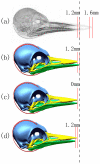Why do woodpeckers resist head impact injury: a biomechanical investigation
- PMID: 22046293
- PMCID: PMC3202538
- DOI: 10.1371/journal.pone.0026490
Why do woodpeckers resist head impact injury: a biomechanical investigation
Abstract
Head injury is a leading cause of morbidity and death in both industrialized and developing countries. It is estimated that brain injuries account for 15% of the burden of fatalities and disabilities, and represent the leading cause of death in young adults. Brain injury may be caused by an impact or a sudden change in the linear and/or angular velocity of the head. However, the woodpecker does not experience any head injury at the high speed of 6-7 m/s with a deceleration of 1000 g when it drums a tree trunk. It is still not known how woodpeckers protect their brain from impact injury. In order to investigate this, two synchronous high-speed video systems were used to observe the pecking process, and the force sensor was used to measure the peck force. The mechanical properties and macro/micro morphological structure in woodpecker's head were investigated using a mechanical testing system and micro-CT scanning. Finite element (FE) models of the woodpecker's head were established to study the dynamic intracranial responses. The result showed that macro/micro morphology of cranial bone and beak can be recognized as a major contributor to non-impact-injuries. This biomechanical analysis makes it possible to visualize events during woodpecker pecking and may inspire new approaches to prevention and treatment of human head injury.
Conflict of interest statement
Figures








References
-
- Barth JT, Macciocchi SN, Giordani B, Rimel R, Jane JA, et al. Neuropsychological Sequelae of Minor Head Injury. Neurosurgery. 1983;13:529–533. - PubMed
-
- Martin E, Lu W, Helmick K, French L, Warden D. Traumatic Brain Injuries Sustained in the Afghanistan and Iraq Wars. American Journal of Nursing. 2008;108:40–47. - PubMed
-
- Junge A, Langevoort G, Pipe A, Peytavin A, Wong F, et al. Injuries in team sport tournaments during the 2004 Olympic Games. The American Journal of Sports Medicine. 2006;34:565–576. - PubMed
-
- Finfer SR, Cohen J. Severe traumatic brain injury. Resuscitation. 2001;48:77–90. - PubMed
Publication types
MeSH terms
LinkOut - more resources
Full Text Sources
Other Literature Sources
Medical

